The world of gaming is constantly evolving, and it’s no surprise that AI is at the heart of this transformation. Imagine stepping into a game where the landscapes unfold endlessly before you, where the characters react to your every move, and the adventure tailors itself to you. That’s exactly what’s happening in the realm of AI-driven game development. Buckle up, gamers and developers alike, because we’re diving into the exciting realm where technology meets imagination, bringing out the very best in both worlds.
AI-Driven Game Development
How AI is Revolutionizing Game Development
If you’re a gamer or take a keen interest in the game development industry, you’ve likely heard buzz around AI – artificial intelligence. It’s not just about sci-fi anymore; AI is transforming the way games are made, and the process is nothing short of amazing. Here’s the lowdown on how AI is reshaping game development.
Creating Smarter NPCs
Remember when non-playable characters (NPCs) used to do the silliest things, breaking the realism in games? Well, with AI, those days are numbered. Game developers are using AI to create more intelligent NPCs that can respond to player actions in lifelike ways. It means characters in games are becoming more believable – they’re evolving and learning from your gameplay. The result? A more immersive gaming experience!
Procedural Content Generation
One of the coolest things AI is doing for game development is procedural content generation. Instead of designers crafting every single tree, building, or map by hand, AI algorithms can generate these elements on the fly. That’s right; games can now produce endless unique environments for players to explore. This not only saves time for developers but also offers a unique experience for each player.
Testing and QA
The dreaded crunch time in game development often includes extensive testing and quality assurance (QA) to iron out all the bugs. AI to the rescue! Now, AI systems can play through levels thousands of times at lightning-fast speeds, spotting glitches and issues that a human tester might miss. This means games are getting polished faster, and developers don’t have to rely solely on energy drinks to get through the testing phase.
Personalized Gaming Experiences
Customization is king, and AI is making personalized gaming experiences the new standard. Through machine learning, games can now adjust their difficulty based on how well you’re playing. Struggling with a level? The game might tone down the challenges a bit. Finding it too easy? Prepare for the game to ramp up the intensity. It’s like the game understands you, making for a more enjoyable play-through tailored to your skills.
Streamlining Development Workflow
AI isn’t just affecting the games themselves; it’s revolutionizing the development process. Tools powered by AI are automating tasks that used to consume hours, like animating complex sequences or syncing character lip movements to dialogue. Developers can now focus on the creative aspects of game craft, knowing AI is handling the tedious stuff.
Enhancing Graphics with AI
Are you wowed by the graphics in modern games? AI’s got a hand in that too. Through techniques like deep learning, AI can upscale graphics, providing incredibly detailed textures without requiring artists to redraw everything in a higher resolution. What you get are stunning visuals that make your gaming worlds look incredibly real.
Voice and Communication
Ever wished you could just talk to game characters and have them understand you? AI’s making strides in natural language processing, which changes how we interact with games. Developers are implementing AI so that you can chat with characters using your voice, and they’ll respond like a real person would. It’s making the line between game and reality blurrier than ever.
In summary, AI’s impact on game development is like a power-up for the entire industry. It’s enabling smarter games, more efficient development, and personalized experiences that make gaming more accessible and enjoyable for everyone. What an exciting time to be part of the gaming community! Whether you’re a developer, a gamer, or just curious about tech, AI in game development is something to keep your eyes on.
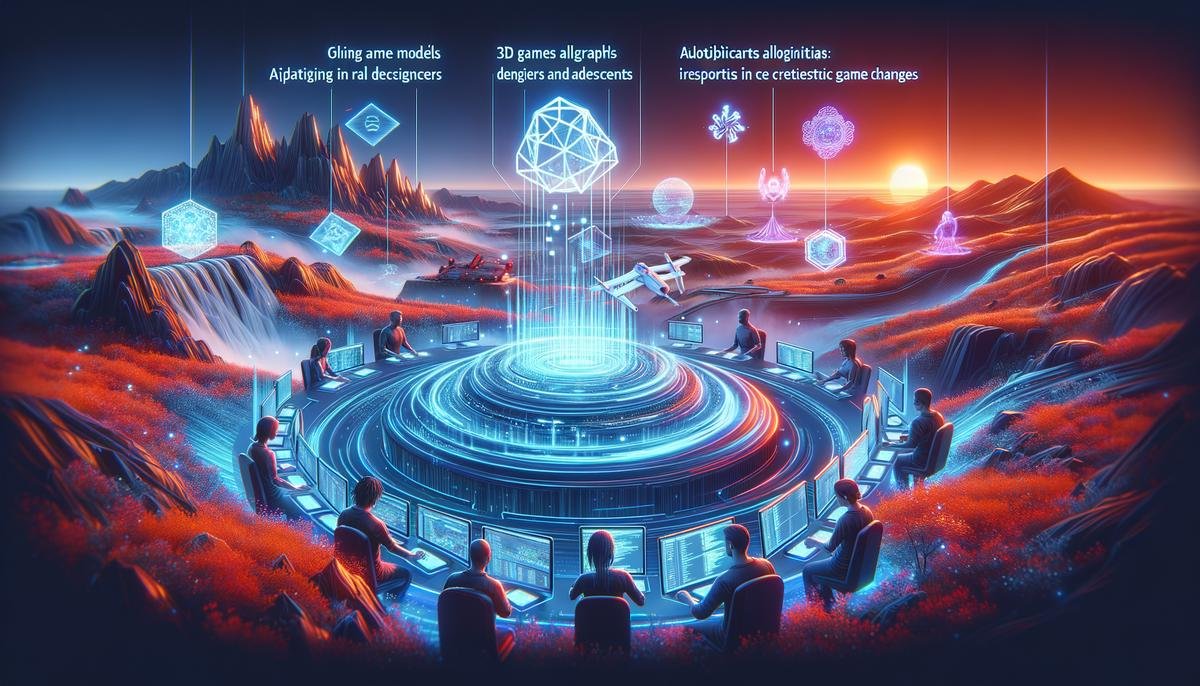
Enhancing Player Experience with AI
AI and Immersive Gaming: Crafting Dynamic Soundscapes and Adaptive Music
Diving deeper into what makes our gaming sessions truly captivating, let’s talk about how AI cranks up the volume on immersion through sound design. Ever noticed how the music in games sometimes perfectly matches the on-screen action? That’s AI for you, working its magic on game soundscapes.
Dynamic Audio Effects
Ever been in a game where the sound of rain changes as you move from outside to inside a building? That’s AI dynamically tweaking audio effects to give you a more realistic experience. It uses environmental cues and player interactions to adjust sounds in real time, making sure that every footstep and every closing door sounds just right. So, the next time the in-game thunderstorm rolls in, you can thank AI for making you want to grab an actual sweater.
Adaptive Game Music
But oh, it doesn’t stop at sound effects. AI also tailors the game’s music to what’s happening in the game, in real time. Picture this: you’re exploring a serene landscape, and the music is a calm, soothing melody. Suddenly, enemies appear, and the music shifts to a heart-pumping rhythm that feels like it’s echoing your racing pulse. That transition? Smooth like butter, all thanks to AI algorithms that ensure the soundtrack keeps pace with the action, enhancing the thrills and chills of your gaming adventure.
Advancing Multiplayer Gaming Experiences
And let’s not forget about multiplayer gaming. AI is changing the game there, too. It’s able to predict player behavior and adjust game strategies, which makes the play seem less predictable and more responsive. You know how sometimes you feel like you’ve got your opponent all figured out? AI keeps you on your toes, constantly introducing new patterns that make every match feel fresh.
Assistive Features for Inclusivity
In the spirit of making gaming a blast for everyone, AI steps in with assistive features that make games more accessible. For those who might need it, AI can modify game play, providing tailored experiences to gamers with disabilities. This could mean anything from adjusting the difficulty level on the fly to providing visual aids for players who need them. Thanks to AI, more people can join in on the fun, perfectly illustrating gaming’s power to bring us all together.
The Future of Gaming with AI
Peeking into the future of AI in gaming is like looking through a kaleidoscope of possibilities. We’re talking about experiences that go beyond what we can imagine, where AI could potentially create entire games on its own. This means fresher content, more intricate storylines, and experiences personalized to such a degree, you’ll feel like games were made just for you.
AI is like the secret sauce that game developers add to the mix to keep us all coming back for more. It personalizes the experiences, keeps the surprises coming, and makes us feel a range of emotions that few other mediums can. Whether you’re a hard-core gamer or a casual player, AI’s influence on gaming is making our favorite virtual worlds more enthralling than ever. So next time you boot up your game and lose yourself in its world, take a moment to appreciate the wizardry of AI working behind the curtain, transforming your playtime into something truly extraordinary. And with AI constantly evolving, who knows what immersive adventures await us just around the corner?
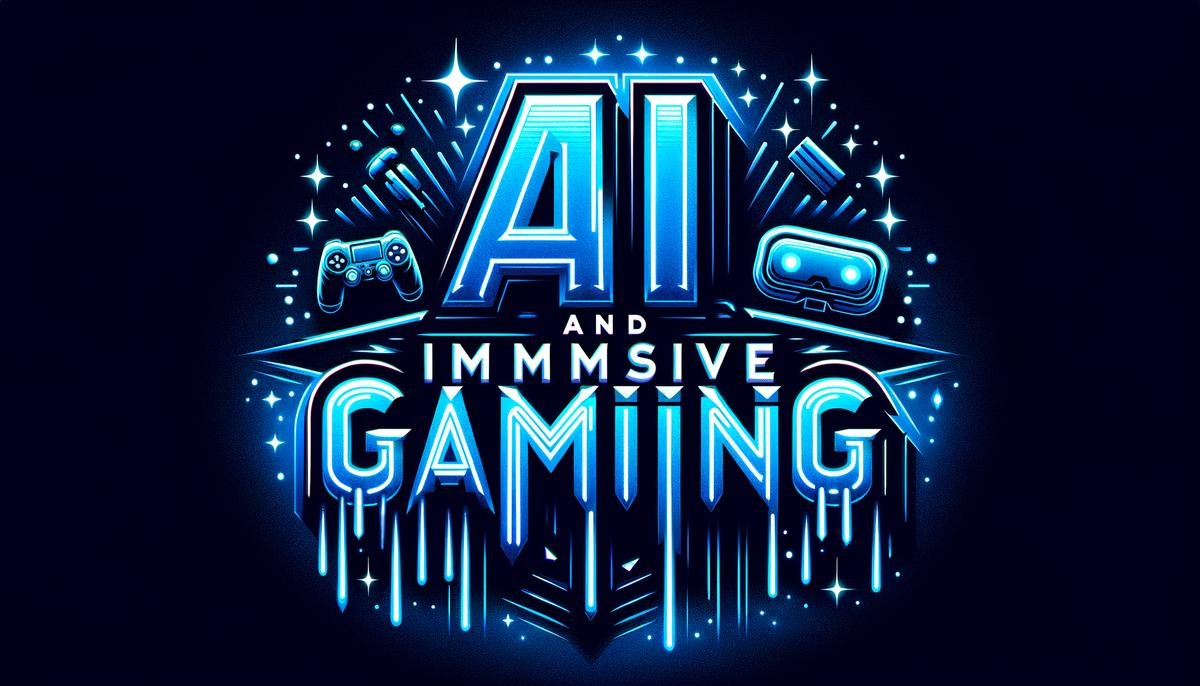
AI and the Evolution of In-game Economics
AI and the In-Game Economy Boom
Picture a gaming world where non-player characters (NPCs) don’t just stand around waiting for your quest; they’re hustling just like you, thanks to AI. But it’s more than lively NPCs. From the sparkle of a sword to the mighty economy governing your virtual world, AI potency is shaping economies in gaming like never before.
In-Game Economies: A Marketplace Revolution
In MMORPGs (Massively Multiplayer Online Role-Playing Games), AI is re-imagining economies. Think of auction houses run by advanced algorithms, where prices of goods and rare items fluctuate based on in-game supply and demand, mirroring the real stock exchange. It’s not just fantasy; dynamic markets driven by AI savvy make you feel like you’ve stepped into Wall Street with dragons.
Trading and Bartering: AI’s Role
The trade isn’t just about clicking a button anymore. AI introduces a rich dynamic where NPCs have trading patterns, remembering past interactions and adjusting their approach to deal-making. If you’re a smooth talker in one transaction, don’t think it won’t come back around. AI keeps score, altering the in-game economy by tracking player habits, crafting unique economic ripple effects.
Monetizing Through AI: Real Profit in Virtual WorldsAI isn’t just reshaping economies for in-game fun; it’s making real-world money. Games with token economies using blockchain are on the rise. AI-controlled markets ensure players can earn and trade virtual goods securely, sometimes cashing in for real dough. Gamers aren’t just gaming; they’re earning, with AI as the new-age financial advisor.
Virtual Goods, Virtual Wealth
The concept of virtual goods creating real wealth is kicking it up a notch. AI bots determine the rarity and worth of items, managing scarcity to keep you grinding for that epic loot. This artificial rarity isn’t just for treasure chests; it’s a finely tuned economic knob that AI tweaks to keep in-game economies bustling.
Adverts and AI: A New Frontier
In-game economies aren’t just about trading sword swings for gold. Advertisements are getting the AI treatment too. Picture virtual billboards in your favorite racing game, with ads that AI tailors to your interests. It’s not just a game; it’s a personalized ad space, where the economy expands beyond the game’s borders into real-world moolah.
AI’s Hand in Cryptocurrency Gaming EconomiesCrack open the crypt, as AI and cryptocurrencies converge. Player-earned tokens fuel a gaming economy, traded on actual crypto exchanges. AI turns gaming into an ecosystem where winning that boss fight can mean pocketing some coin that’s worth more than just bragging rights.
Cashing In: How Players Benefit
Alright, so how does this affect you kicking back with a controller? It’s simple. The AI-driven in-game economy means you could be sitting on a gold mine. Those hours leveling up could translate to actual earnings, with AI propelling the in-game economy towards real-world value. Gaming becomes not just an escape but potentially a side hustle, too.
Microtransactions and AINow, let’s chat about microtransactions, ’cause they’re everywhere. AI cleverly suggests in-game purchases, understanding your play style. You might balk at the idea, but when AI offers you that perfect skin or power-up at just the right moment, your wallet might just come out. It’s strategic economy enhancement, with AI as the ultimate salesperson.
AI’s Impact Beyond the In-Game Economy
Outside of in-game economies, AI’s reach in the gaming industry is also influencing how games get made and sold. Game developers use AI to better understand player habits, tailor marketing strategies, and predict what kind of games will sell. It’s a level-up for developers, with AI providing insider knowledge to tap into the market.
Player Empowerment and AI
Finally, let’s not forget player empowerment. AI in gaming economies is offering gamers control, right? Players can influence the virtual market, engage in entrepreneurial activities, and impact the game world’s financial landscape. It’s power to the players, with AI as the new rule book.
Gamers, welcome to the new economy. It’s not just virtual coins we’re collecting; it’s an AI-powered experience reshaping the value of our gaming efforts, with echoes in the real world. So next time you trade in that virtual marketplace, remember AI’s behind the scenes, pulling the levers of an economic machine that’s more alive than ever.
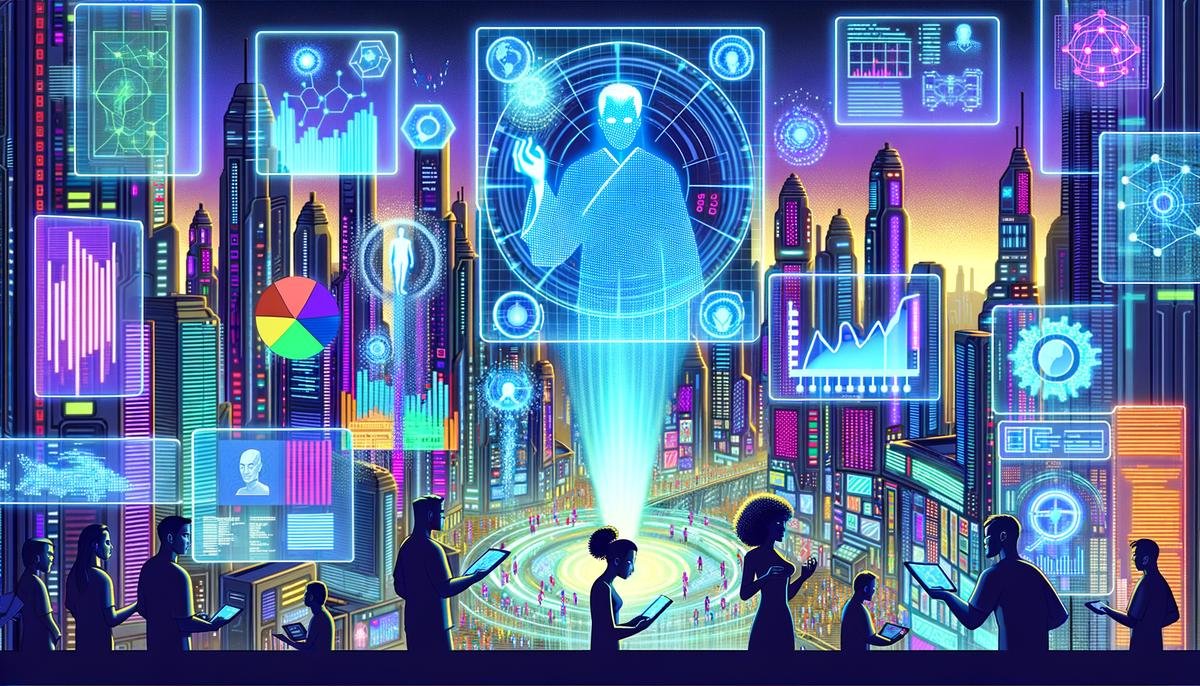
The Ethical Implications of AI in Gaming
All right, let’s dive into the ethical questions that pop up when you blend AI with the gaming world. Believe it or not, this tech-packed combo is like a double-edged sword. On one side, it’s super cool with all the new experiences and improvements it brings. But flip it over, and suddenly you’re face-to-face with some tough ethical brain-teasers. So, what’s cooking in the ethical dilemma pot? Let’s buckle up and zoom in!
First off, we’ve got to chat about player privacy. Picture this: you’re deep into a game, and the AI is learning your every move. It’s kinda like having a mind-reader as a sidekick. While that’s kinda awesome, it also means the game’s collecting a bunch of data about you. Who gets that info? How is it used? These are red-hot questions looking for some cool answers.
Now, let’s say AI gets super good at predicting what keeps players hooked. Awesome, right? But hang on a sec. There’s this slippery slope where games could become way too addictive. We’re talking about AI understanding your sweet spots so well that putting down the controller becomes a Herculean task. What’s the line between fun and too much? Yep, another ethical pickle.
Moving on to another head-scratcher: AI-generated content. It’s like having an endless box of Legos to play with. But who owns the stuff AI creates? If an AI cooks up a super cool level or character, can you claim it as your own? Or is it more like finding a twenty on the sidewalk? Credit and rights in AI-generated content are murky waters that game developers and players are both wading through.
Here’s the kicker: deepfakes and impersonations. With AI getting crazy good at mimicking voices and faces, what happens when you can’t tell if you’re gaming with your buddy or a bot? Impersonating players could get out of hand faster than you can say “game over.” And let’s be real, that’s a bit of a trust buster.
Then, think about the fairness factor in competitive gaming. If AI’s leveling up characters and strategies, where’s the level playing field? It’s a bit like handing out jetpacks in a foot race. Some players might have AI-fueled advantages that others don’t. So, how do we keep things fair for all the gamers out there?
Oh, and let’s not forget about AI in storytelling. When you’ve got AI shaping stories based on your choices, things get personal. But it’s this very personalization that can tug at our emotional strings. What if AI stories influence our real-world views and decisions? It’s like opening a book that reads you back, and that’s got some ethical implications written all over it.
All these points swirl around a big, central question: how do we keep the human in humanity when AI is sharing the stage? It’s about balance, folks. We need to juggle the amazeballs benefits of AI in games while keeping a sharp eye on those tricky ethical issues.
So, there you have it—the lowdown on the ethical side of AI in gaming. Whether you’re a weekend warrior on the console or a full-on gaming aficionado, these are the real deal conversations we need to be having. Because at the end of the day, gaming’s about fun, and tossing these ethical questions into the mix keeps us all in check. Game on, but let’s play it smart and ethical!
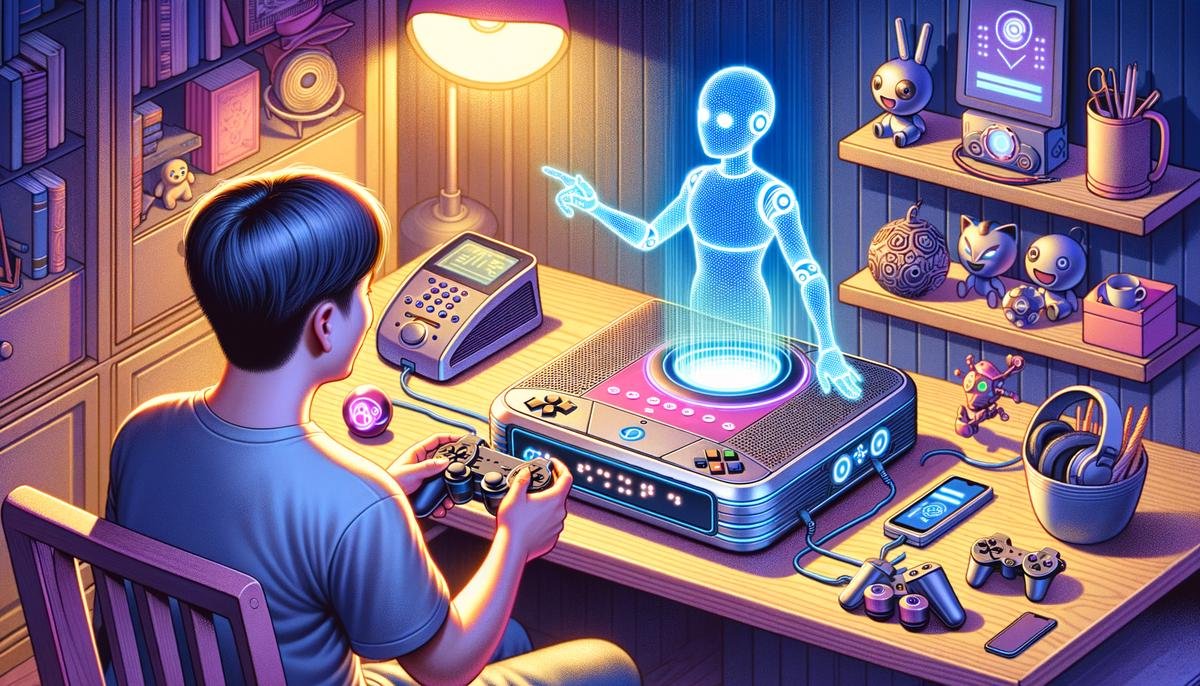
Preparing for an AI-Powered Gaming Future
As the gaming industry continues to evolve, the integration of Artificial Intelligence (AI) is revolutionizing how games are played, developed, and experienced. AI technology is an exciting frontier for gamers and developers, but preparation and adaptability are crucial to navigating this rapidly changing landscape. Here’s how gamers and developers can get ready for the wave of AI-driven transformations in the gaming world.
Gamers: Leveling Up with AI Education
To embrace AI technologies in gaming, gamers can start by educating themselves about AI’s capabilities. Understanding the basics of how AI works, such as machine learning algorithms and neural networks, allows players to appreciate the sophisticated mechanics behind AI features they encounter in games.
Adopting AI in Gaming Strategies
Gamers can also adapt their gaming strategies to incorporate AI’s advanced mechanics. By realizing that non-player characters (NPCs) have smarter behaviors and dynamic responses, players can anticipate more challenging and rewarding interactions that require tactical flexibility and creative problem-solving skills.
Staying Informed and Engaged
To prepare for AI’s increasing prominence in gaming, players should stay informed about the latest developments. Participating in gaming communities, following industry news, and engaging with developer updates can provide valuable insights into how AI is shaping the future of gaming.
Developers: Crafting the AI-Enhanced Gaming Frontier
Developers have the task of harnessing AI’s potential to create innovative gaming experiences. To do so effectively, they’ll need a deep understanding of AI technologies and the imagination to integrate them creatively into their projects.
Investing in AI Research and Development
Investment in AI research and development is key. Developers need to explore AI’s multifaceted applications, such as enhancing realistic game environments or crafting complex, emergent storylines. This research can lead to groundbreaking gaming advancements that continuously raise the bar for the industry.
Building Skills in AI Programming and Ethics
Developers should hone skills in AI programming and understand the ethical considerations of AI integration. As AI becomes more sophisticated, developers must address issues related to player privacy, data security, and the moral implications of AI in storytelling, ensuring that games are not only innovative but responsible and respectful to the player base.
Collaborating Across Disciplines
The impact of AI is not limited to programming; it extends to the arts, narrative design, and sound engineering. Developers will benefit from cross-disciplinary collaboration to fully leverage AI’s potential in creating more immersive and emotionally engaging games.
Emphasizing Inclusivity and Fair Play
Ensuring that AI features promote inclusivity and fair play is another aspect developers should focus on. AI-driven assistive technologies can make games accessible to a broader audience, while algorithms designed to detect and prevent cheating can maintain competitive integrity.
In conclusion, AI in gaming is more than a trend; it’s a transformative force reshaping the very foundation of how games are played and created. By staying knowledgeable, adaptable, and responsible, both gamers and developers can not only prepare for but also actively shape an exciting AI-powered future in the gaming industry. Let’s get ready to play the games of tomorrow, where the boundary between technology and imagination melds into an experience unlike any other.
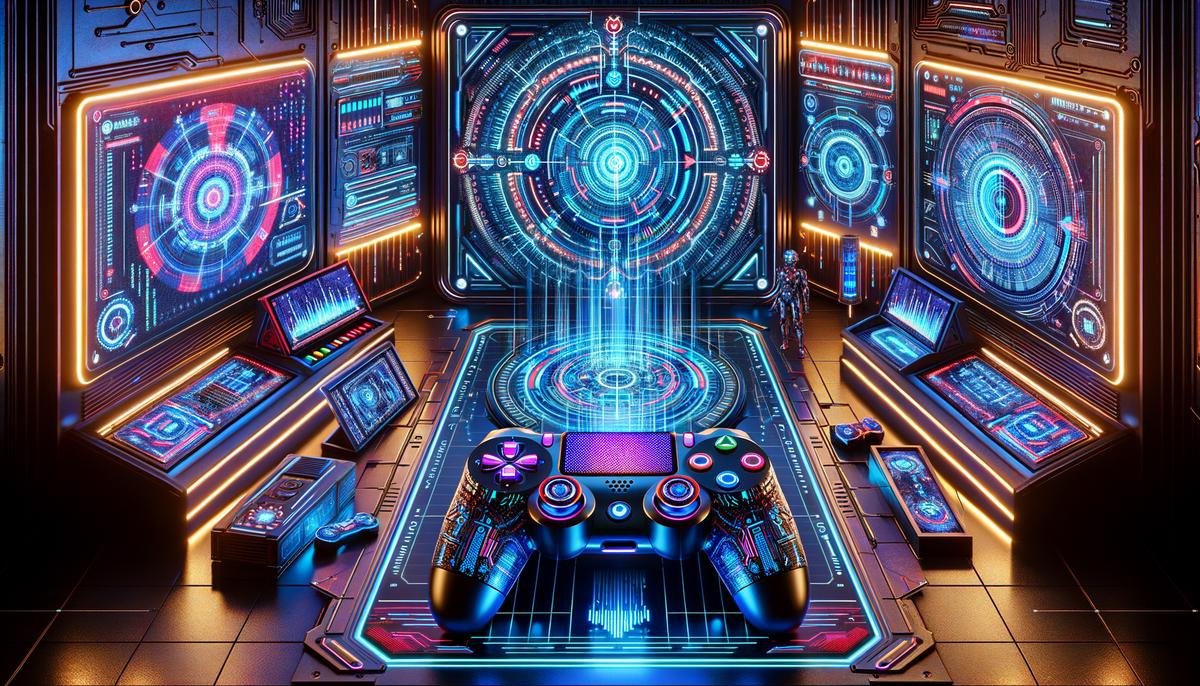
Gaming has always been about pushing boundaries and exploring new frontiers, and with AI, we’re on the cusp of a thrilling journey. From the enriched player experiences to smart in-game economies, it’s clear that AI is not just changing the game—it’s changing us. As we look ahead to an AI-powered gaming future, we’re not just talking about the next level of play but opening doors to new opportunities and challenges that’ll shape the industry for years to come. Gear up, because the future is here, and it’s more interactive than ever before!



